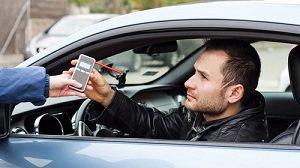Random Sobriety Checkpoints are Legal in Illinois
 The Fourth Amendment to the U.S. Constitution requires police officers to have probable cause before making a traffic stop. In other words, the police can only stop a driver if they have reasonable grounds for pressing charges. For example, if a driver runs a traffic light, drives faster than the posted speed limit or commits any traffic violation leading to an accident, then he can be pulled over by police.
The Fourth Amendment to the U.S. Constitution requires police officers to have probable cause before making a traffic stop. In other words, the police can only stop a driver if they have reasonable grounds for pressing charges. For example, if a driver runs a traffic light, drives faster than the posted speed limit or commits any traffic violation leading to an accident, then he can be pulled over by police.
So if the Constitution requires police to have probable cause before making a traffic stop, does that mean random sobriety checkpoints–where any driver can be stopped, whether or not probable cause exists–are unconstitutional? No. The U.S. Supreme Court has ruled that random checkpoints are an exception to the Fourth Amendment guarantee against unreasonable searches and seizures.
Constitutionality of Random Checkpoints
In 1990, the U.S. Supreme Court held that police sobriety checkpoints do not violate the Fourth Amendment. The case, Michigan Department of State Police v. Sitz, questioned the constitutionality of using random checkpoints to catch drunk drivers. The court balanced the government’s interest in stopping drunk driving with the driver’s Fourth Amendment rights, finding that the constitutionality of random checkpoints tilts in the government’s favor.
While some states have ruled that sobriety checkpoints violate their respective state constitutions, the practice is legal in Illinois. In fact, some states, including Illinois, have taken matters a step further by instituting “no refusal” policies, in which motorists suspected of drunk driving who refuse to take sobriety tests can be ordered to submit to blood tests. Kane County recently participated in a "no refusal" night that led to the arrest of seven suspected drunk drivers.
The Consequences of Driving under the Influence
Driving under the influence of alcohol or drugs is a serious offense with serious consequences. The charge for a first offense is a Class A misdemeanor, which is punishable by up to one year in jail and a $2,500 fine. Additionally, the driver will lose his license for at least six months. If the driver refuses to take a sobriety test then he could lose his license for 12 months. The charge for a second offense is also a Class A misdemeanor, but the offender will be sentenced to a mandatory minimum five-day prison sentence or 240 hours of community service, in addition to criminal and administrative penalties permitted under state law.
A third offense is a Class 2 felony, punishable by three to seven years in prison and a $25,000 fine. Furthermore, the state can revoke the offender’s driving privileges for a minimum of 10 years and suspend his vehicle registration. The consequences are even more severe if someone was injured by the driver’s actions, or if the driver has more than three DUIs.
Do you have questions about the legalities of DUI checkpoints or other issues regarding driving under the influence? Contact Kane County attorneys at Law Office of James F. White, P.C. today for answers and for legal representation in your case. We serve clients throughout the western Chicago suburbs from our office in Sugar Grove, Illinois.





